Stay in the know on all smart updates of your favorite topics.
My highlights from the exchange between the Province of North-Holland and Baden-Württemberg
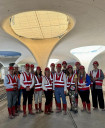
On May 17 and 18, I had the honour to join regional minister Olthoff from the Province of North Holland on a mission to Stuttgart, Baden-Württemberg. We went there to exchange experiences and learn from each other especially in the field of smart mobility.
After a nice train ride of no longer than 6 hours, we arrived in Stuttgart. We started our trip with a visit to ArenA2036 and Plug and Play Techcenter. A state-of-the-art research campus connected to a startup accelerator. Sascha Karimpour, director of Plug and Play, enthusiastically introduced us to their startup accelerator. He told us how they bring research and industries together and find efficient ways to collaborate with startups.
“To keep it exciting we constantly have to change. The major challenge now is not only matching start-ups and companies but also putting a lot of effort in stakeholder management, because if you don’t do that it will fall apart” - Sascha Karimpour.
In the research lab of ArenA2036 we saw amazing technologies come to life. From smart floors to highly advanced robotica and intralogistics; optimizing human and robot logistics in production. Peter Froeschle, CEO of ArenA2036, showed us around.
“Bringing all disciplines together increases creativity. But building an innovation platform is much more than just providing the facility. You need to keep the fire burning.” – Peter Froeschle.
In the afternoon, we had an official exchange with Verband Region Stuttgart. Here we learned that the Province of North Holland and Baden- Württemberg face a lot of the same mobility challenges. Similar to the Province of North-Holland, the interaction between urban and rural areas is important in Baden- Württemberg. We visited their innovative mobility hub concept. With standard services like the bus, taxi, P&R, bike & ride, but also an Information Terminal and 24/7 Info hotline, bike service station and kiosk.
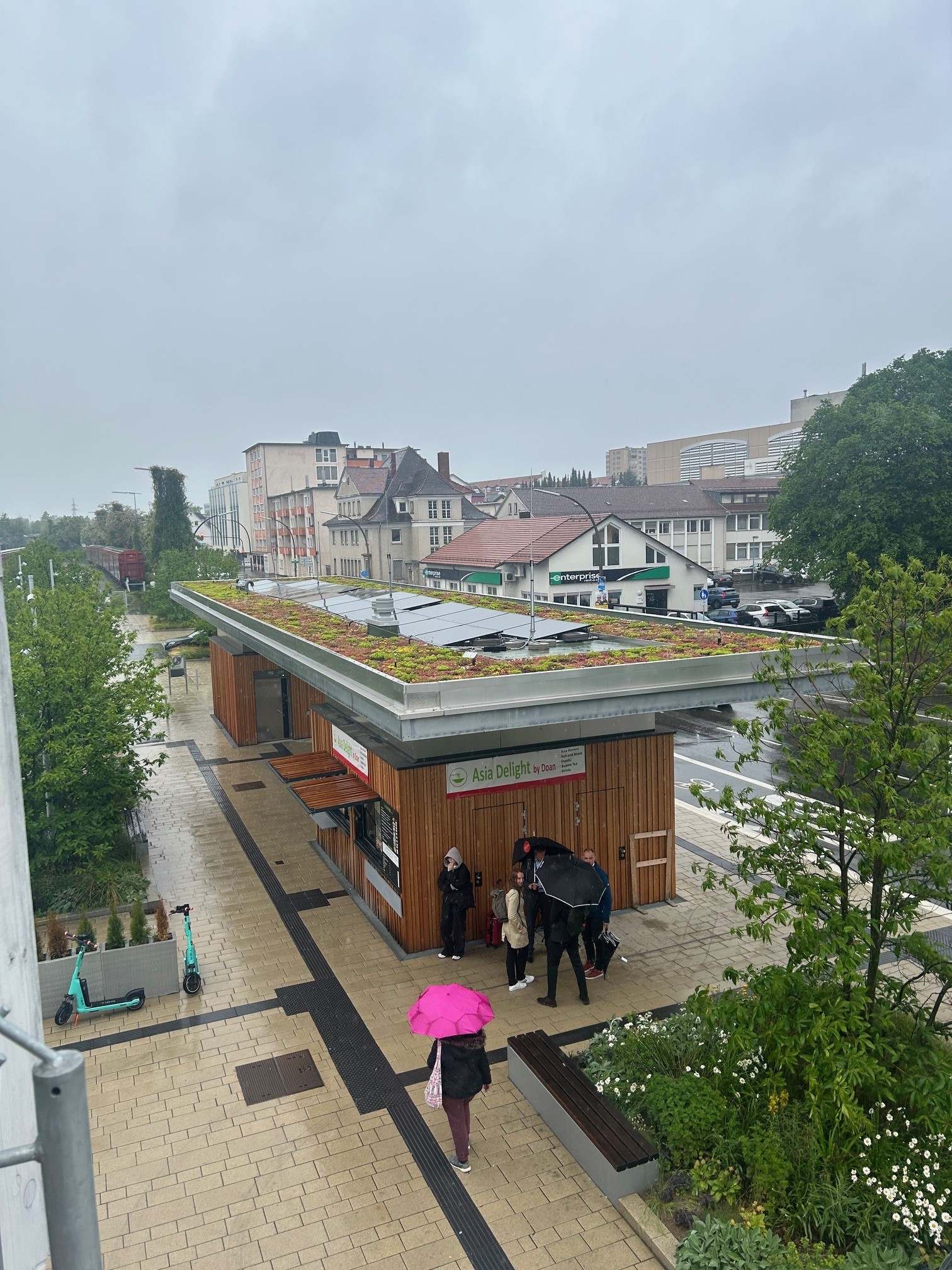
Afterwards, we visited the construction site of Stuttgart 21, a large fully underground train station and 60km tunnel - a highlight of the trip! The impressive station is designed by the architect Ingenhoven. The prestigious design is characterised by its huge concrete pillars and a glass roofs providing light. A very controversial project which in the end was voted for in a referendum with 57% of the votes. By building the train station underground, public space in the city center will be freed up for housing. Take a look yourself at this unique project.
The next morning, we continued the knowledge exchange with the ministry of Transport of Baden- Württemberg. We learned a lot from their ambitious plans. State secretary of Transport Zimmer presented us the ambitious plans of Baden- Württemberg. Their goal is to be climate neutral in 2040, which is 10 years earlier than the EU ambitions. They really aim to be the frontrunner. Inspiring financing tools like a Mobility Pass and a Mobility Guarantee were presented. As well as diverse modalities of Mobility on Demand in more remote locations.
All in all, it was a very inspiring trip! We learned a lot and strengthened the ties with the Baden- Württemberg region.
Recap of Demoday #22
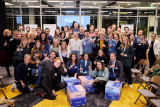
On Thursday December 14th, Amsterdam Smart City partners concluded 2023 with an afternoon full of inspiration, exchange and connections at our 22nd Demoday! Our partner Deloitte welcomed our network in The Garage, where their ‘Deloitte Studios’ department is located. In this article, we’ll give you a quick overview of the Knowledge Session, Work Sessions and Pitches. Interesting in learning more? Read the full reports by our Programme Managers Noor, Pelle and Sophie (linked below).
About our Demodays
The Demodays are one of the tools we use to stimulate innovation and encourage connection between our partners and community. The purpose of the Demodays is to present the progress of various innovation projects, ask for help, share dilemmas and involve more partners to take these projects to the next level. More information about the Demodays can be found here.
Knowledge Session: Change in the here and now, with Theory U
To kick-off our final Demoday of 2023, our brand-new partner Hieroo led an inspiring knowledge session about the change method they use for social innovation in the city: Theory U. Dorien Schneider and Maartje Krijnen taught us more about this methodology and how it can help us solve complex problems by shifting from ego to eco-thinking. Read the full report here.
Work sessions
After the plenary Knowledge Session we split up in different worksessions, each exploring regional innovation challenges. As always, we had set up the sessions’ topics and moderation in collaboration with our partners.
Mobility | Decision-making along the principles of Inclusive Prosperity – Jurhan Kwee (Municipality of Amsterdam)
In The Netherlands, the concept of ‘Inclusive Prosperity’ is on the rise. Policy makers are busy defining this concept, figuring out how to put this concept into practice and what it means for their decision-making process. Together with his colleagues at the Municipality of Amsterdam, Yurhan Kwee hosts sessions on decision-making along the principles of Inclusive Prosperity. With the input he gathers, he hopes to make the decisions needed for our Inclusive Prosperity ambitions more understandable and transparent, both for Amsterdam’s administrators and councillors as well as its citizens. Read Pelle’s recap article here.
Digital | Data Commons Collective: Using data for a liveable city – Lia Hsu (Amsterdam Economic Board) and Simone van der Burg (Waag)
In the big tech-dominated era, data has been commercially exploited for so long that it is now hard to imagine that data sharing might also benefit the community. Yet that is what a collective of businesses, governments, social institutions and residents in Amsterdam aim to do. Sharing more data to better care for the city. On behalf of the Data Commons Collective, Lia Hsu (Strategic Advisor at Amsterdam Economic Board) asked the Amsterdam Smart City network for input and feedback on their Data Commons initiative. Read Sophie's recap article here.
Energy | How can we continue to facilitate the homeowner in driving the energy transition? | Wouter van Rooijen (Alliander)
Wouter van Rooijen (Alliander) discussed the challenges related to grid congestion. From 2030 onwards, it is expected that a significant portion of the low-voltage network will experience both over- and under-voltage. While the network will be reinforced as quickly as possible, the lack of labour capacity is also prompting the consideration of alternative solutions.
The solution that emerged from Wouter's co-creation process was WijkWise. In this work session, Wouter aimed to validate the WijkWise concept and find parties that could contribute to its development and market implementation. Dave van Loon from Kennisland moderated the session. Read Noor’s recap article here.
Circular | Navigating eco-emotions: The impact of working in sustainability on your mental wellbeing| Marian Zandbergen (Hogeschool van Amsterdam)
This work session, led by Marian Zandbergen (CIRCOLLAB, HvA) and moderated by Mareille de Bloois (Royal HaskoningDHV), explored the challenges and opportunities associated with eco-emotions, both personally and within organizations. The key question addressed was: How can individuals and organisations constructively manage eco-emotions, and what implications does this have for organisations? Read Noor’s recap article here.
Pitches
To end this festive afternoon and the year 2023 as a whole, we invited project owners and -members to present their progress and next steps on topics brought in during our events and deep-dives throughout 2023. The following projects were presented. You can read more about these topics on their dedicated articles and project pages, linked below.
Local Energy Systems: Where we started, what we have achieved, and what are the next steps – Omar Shafqat (University of Applied Sciences Amsterdam)
Connecting the resource- and energy transition – Edwin Oskam (MRA)
ChatGPT and the government: Possibilities and impact on our work – Jeroen Silvis (Province of North Holland)
Floating urban districts: Future-proof living in the Metropolitan Region – Joke Dufourmont (AMS Institute)
Mobility Justice: Raising the topic of Mobility Poverty and the working group’s progress – Bas Gerbrandy (Province of North Holland)
Our next Demoday will take place in April. Do you have an inspiring story or project you want to pitch to the Amsterdam Smart City network? Let us know via sophie@amsterdamsmartcity.com
Demoday #22: Inclusive Prosperity & The Case Of Experiments In Public Space
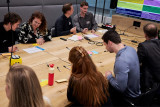
*This article makes use of the term Inclusive Prosperity as the English translation for the Dutch word; ‘Brede Welvaart’
In The Netherlands, the concept of Inclusive Prosperity* is on the rise. Policy makers are busy defining this concept, figuring out how to put this concept into practice and what it means for their decision-making process. Together with his colleagues at the Municipality of Amsterdam, Yurhan Kwee hosts sessions on decision-making along the principles of Inclusive Prosperity. With the input he gathers, he hopes to make the decisions needed for our Inclusive Prosperity ambitions more understandable and transparent, both for Amsterdam’s administrators and councillors as well as its citizens.
Inclusive Prosperity
Inclusive Prosperity is about more than just money. It involves everything that people consider valuable, such as health, the quality of education, the environment, a safe living environment, and equal opportunities for everyone. It's about the quality of life in the present, and the extent to which this affects the prosperity of future generations or those of people elsewhere in the world.
According to the definition, used by the Municipality, there are 8 themes to consider:
1. Subjective Well-being
Subjective well-being refers to the evaluation people make of their lives. Consider the question, "How satisfied are you with life in general?"
2. Health
The theme of Health encompasses physical illnesses and conditions, as well as mental health, living with limitations, perceived health, and self-regulation and resilience.
3. Consumption and Income
The theme of Consumption and Income refers to how income provides people with the freedom and opportunities to consume, including purchasing services and goods, maintaining a financial buffer, and shaping one's lifestyle.
4. Education and Training
Thinking about the theme of Education and Training involves the transfer of knowledge and skills, socialization, and considering the education or training experiences of individuals.
5. Spatial Quality and Cohesion
Regarding the theme of Spatial Cohesion and Quality, consider the following: a qualitatively well-designed space is a crucial precondition for the perceived broad prosperity. This includes spatial design on a functional level and with a focus on the future.
6. Economic Capital
Depending on the case, consider how it relates to:
- Human capital: the combination of competencies, knowledge, and skills;
- Physical capital: material possessions, such as machinery, buildings, and infrastructure;
- Knowledge capital: intangible assets, such as research and development, data, and patents;
- Financial capital: the financial resources of households and the government (purchasing power).
7. Natural Capital
Natural Capital refers to the stock of natural resources. Consider items such as (drinking) water, food, minerals, wind-sun-water energy, biodiversity, etc. Assess whether they are sufficiently available, in shortage, or if there is damage to these resources.
8. Social Capital
The concept of Social Capital often refers to the benefits of social networks, such as access to information and resources. This involves connections within and between groups. Positive effects can lead to trust, while negative effects can lead to loneliness.
Experimenting (with Mobility related policies) in public space
The case we used during this session is the use of experiments in public space, altering mobility or travel infrastructure. The months leading up to this afternoon, Amsterdam had put different experiments into practice (e.g. de ‘knip’ and de ‘paaltjesproef’) resulting in heated discussions, about both the success and desirability of using this method.
In a more objective manner, we used the Broad Prosperity principles to argue why its either desirable or undesirable to put such methods into practice.
Results
The group agreed that these Amsterdam experiments, concerned with creating calmer, more liveable urban areas, score well within themes like; Health (less air & noise pollution), Nature (more space for green and biodiversity), Social capital (more space and opportunity to meet and interact), Spacial quality (less dangerous and more moving space) and education (experimenting, learning by doing, viewing urban planning as experimenting and an ongoing learning process). However, as this year’s backlash on the experiments showed, there are some negative aspects to consider. Examples of domains in which we found some negative aspects, were; Economy (decreased speed and efficiency), Consumption & Income (local shop- and restaurant-owners need to be flexible and could be victims of changing infrastructure) and Subjective Well-being (citizens feel used, disadvantaged, and there is ambiguity about the purpose).
We found it difficult to arrive at a common answer because advantages and disadvantages exist on each theme separately. However, there was a common notion that the success of this method is rooted in clear and transparent communication on the effects and goals of such experiment. Frustration should be minimized and the opposing arguments should be taken seriously. Furthermore, we discussed the difference between a ‘real’ experiment in which every outcome is a success, and a trial, which is used to test a policy that’s envisioned for future years. The one who initiates the experiment should have this very clear for itself.
While one of the strengths of this method is the need to value these different domains in a more equal and objective manner, it proved to be difficult in practice. We all had the tendency to give some aspects more weight than others. While we were supposed to set up an advice and practice with decision-making along the principles of Inclusive Prosperity, it turned out to be challenging to let go of our prior experience, prejudices and opinions on this subject. We weren’t sure whether this is always a negative thing, but it’s one of the considerations Yurhan took home in the Municipality’s exploration of this approach.
Together, we experienced the challenge of working together with a new concept and approach. It should be an ongoing practice and discussion, a collective effort. Sessions like these serve that purpose perfectly.
Feel free to get in touch with me if you want to know more about the municipality’s and Amsterdam Economic Board’s efforts on the topic of Inclusive Prosperity.
ICC Phase 2: Kick off in Brussels

The Intelligent Cities Challenge (ICC) is one of the European Commission’s largest city support initiatives supporting European cities in their green and digital transitions. ICC delivers knowledge and support services to cities and their local economies to address two major challenges: making the transition to a net-zero economic model, while enabling social inclusion and sustainable development for every EU citizen.
Cities learn how to address these challenges through Local Green Deals: integrated, multi-disciplinary action plans to lead the green and digital transition across sectors from the built environment, urban mobility and renewable energy systems to tourism or small retailers. Cities become members of a vibrant network, gain access to advisory services, innovation and sustainability management techniques, cutting-edge technology and training and get inspiration and advice from peers and mentor cities.
Building on the success of the previous edition of the ICC programme (2020-22) and Digital Cities Challenge (2017-19), the ICC will now enter Phase 2!
Amsterdam as a Mentor City
Like previous years, Amsterdam has been selected to join the support programme as a mentor city. The city will play a leading support role by guiding the 64 core cities as they embark on their two year journey to create impactful strategies and develop innovative solutions that will place the cities at the forefront of the green and digital twin transition through Local Green Deals. A nice compliment, allowing the Amsterdam Region to share their experiences and learnings from setting up Local Green Deal initiatives over the past years.
The Intelligent Cities Challenge Strategy City Lab: Accelerating the Twin Transition (November 2023)
On 23 and 24 November 2023, over 200 people - a mix of Intelligent Cities Challenge (ICC) core and mentor cities, political leaders and representatives from European institutions gathered for the first time in-person to discuss the status quo of Twin Transition. Through examples and best practices, attendees had the honour to hear from over 30 speakers as they shared insights into collaboration methods, Local Green Deals, climate ambitions, digital transitions and more across the course of 20 sessions.
Amsterdam Smart CIty's Leonie van den Beuken travelled to this gathering in Brussels as one of the representatives of the Amsterdam Region. She summarized her trip as follows:
This EU program helps cities from north to south, east and west to connect, share and learn. A much needed interaction, as we all try to improve the quality of life of our citizens. We all struggle with the ever rising cost of living. And we all want to get our cities to become more sustainable.
None of this comes easy, but we all know that local collaboration plays a key role. Building local coalitions between government, businesses and citizens is one thing, but how do we make sure these so called coalitions of the willing actually become coalitions of the doing?
Some of the learnings we shared from the Amsterdam Region are; the need for political support and the importance of trust and respect.
Local political leadership will inspire and guide society and entrepreneurs to invest and contribute. However, make sure pilotical support doesn’t evolve into political ownership. When that happens, societal parties and businesses tend to step out the coalition.
Take the importance of trust and respect seriously. You need to show long term commitment, take time to create understanding between parties. Take competition between participating SME’s serious and define together how to handle this together. Create a workflow in which smaller parties are allowed to participate less intense but sill feel incorporated.
We'll keep you up to date on our participation in future gatherings and results from ICC Phase 2. Want to know more? Check https://www.intelligentcitieschallenge.eu/
Demoday #20: Urban Air Mobility: Use-cases and equity considerations
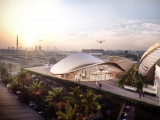
When considering the future of (urban) mobility we often limit ourselves to urban mobility options we’re used to, like our road- water- and railway networks. But what if we think outside of the box. What if we extended our urban transportation system with sustainable aviation options?
Introducing Electric Vertical Take Off & Landing (eVTOL) options into our transportation system could be a promising move in achieving our urban and provincial goals. Examples of its benefits are; reduced greenhouse gas emissions by electrification, serving rural communities, more efficient emergency response, and decreased surface congestion and crash rates.
And what about some critical issues regarding this development? Think; dependence on battery technology and lithium scarcity, the immense pressure on the energy grid and complications when implementing in cities with old infrastructure cities like Amsterdam.
Case & Set-up of the Session
During our 20th Demoday we had an international guest; Kerry Rohrmeier. During her work as a researcher at San Jose State University, she was finalizing a paper on Urban Air Mobility (UAM). She was visiting The Netherlands to gather input on possible use-cases and considerations from Dutch experts and aviation related networks. As part of her visit, Chris de Veer invited her to join our Demoday and gather input from the Amsterdam Smart City network. It turned out to be a win-win situation. Kerry introduced this sci-fi-esque subject -and its progress in the US- to the network, and a diverse set of participants discussed her research questions in a focus-group setting.
The following paragraphs describe Kerry’s research topics and the answers we came up with as a group.
Insights:
Appropriate UAM use cases in broader sustainable systems
The group saw eVTOL modes of transport as;
- A promising alternative to our costly regional transport system, due to its small form, autonomous driving and on-demand possibilities.
- An alternative to ferry transportation to (nearby) national islands like Texel and Terschelling.
- A sustainable mode of transportation for sports teams traveling to- and from national opponents.
- A sustainable and efficient mode of transportation for emergency teams like the ambulance, police and firefighters. Its use would cut response- and travel times.
- A luxurious alternative to private jets and polluting travel behaviour by the rich.
Equity implications of new UAM and vertiports networks
When it comes to affordability of UAM services the question arises; who should take the lead in its implementation? Public authorities or the market? Subsidies and investments from the government would be needed but to what extent? Private parties could push down pricing create more value with air travel by collecting and selling data from the air (e.g. air-quality and weather predictions) but how desirable is this?
There are also questions regarding safety, because; how to preserve safety in and outside unmanned aircrafts? This led to discussions regarding the use of cabin ‘hosts’ and on ground safety persons monitoring in-cabin safety. Furthermore, someone pointed out how this was also one of the main concerns when elevators where introduced for the first time. This idea of using a closed space with strangers brought up the need for an elevator ‘operator/host’. Later on, this necessity slowly decreased. This could be an interesting case to study when addressing this ‘trust’ and safety topic.
Conclusions and nest steps
Kerry was very content with the discussions that were initiated and the insights she gathered from our perspectives on the case of Urban Air Mobility. It’s important to consider and play into this topic when designing our sustainable transportation system for the future. There are a lot of opportunities, mentioned in the paragraphs above. However, how this development could make a transportation system more ‘just’ and equal remains the question. While we see a rise in innovation and private parties willing to bring eVTOL to the next level, the discussions regarding affordability (for the masses), safety, and its reliance on batteries and a congested energy grid will require special attention.
For now, Kerry Rohrmeier will finish her research paper on this topic and we hope to update you soon with its publication and conclusions! Would you like to know more about this topic or get in contact with Kerry? Let me know via pelle@amsterdamsmartcity.com
Demoday #20: Knowledge session ‘Power in Transitions’
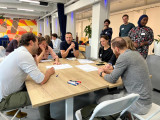
When working together on transitions, it is important to be aware of and sensitive to the impact of power and systemic oppression in participatory processes. Within the Amsterdam Smart City network, the question of inclusion and civic participation, is often brought up in worksessions and discussions. However, we often lack the tools to find the bottlenecks and really include all important beneficiaries.
Therefore, we asked our valued partners Kennisland and DRIFT to lead a workshop about Power in Transitions at Demoday #20 on May 16. Dave van Loon and Faduma Mukhtar (Kennisland) together with Aron Teunissen (DRIFT) taught the participants more about power in transitions, based on the Power Literacy Framework and Field Guide from Kennisland. This guide describes five different forms of power and offers a set of tools for professionals to become more aware of power dynamics in their work.
The five forms of power
According to the Power Literacy Guide by Kennisland, there are five forms of power in design process. If you want to learn more about this, you can download the Power Literacy guide here. The five forms of power are:
Privilege: The type of power you get from a social relation whereby you benefit due to the social group you belong to, at the expense of another social group. It is an unearned advantage and often invisible to those who have it.
Access power: The ability to influence who is included in and excluded from the design project and process.
Goal power: The ability to initiate the design project to begin with, as well as the ability to influence decisions related to framing the problem, goals, and structure of the design process.
Role power: The ability to influence the roles that different stakeholders take on. This includes the ability to assign any roles or titles in the design process, as well as influencing the role each stakeholder plays in making decisions.
Rule power: The ability to influence the way that those in the design process will work together. It includes the ability to influence what is considered normal, what is allowed and what isn’t, how actors will communicate with each other, what language is used, and beliefs about what types of knowledge are valid.
Power check
After a theoretical introduction of the five forms of power, we split into smaller groups to perform a so-called power check for different Amsterdam Smart City projects, such as the Mobility Challenge and “Wat mensen beweegt”. Using this power check, the participants looked at access power and goal power. We identified all actors affected by the project and indicated which actors were not involved. The different actors were then assigned a role in different stages of the process: listener, co-creator, advisor, partner or director.
Most important take-aways
The goal of this exercise was to create more awareness about involving target groups in different stages of the project. The main take-aways were:
The role for the for the ‘benefit group’, the people that are impacted by the project, is often too small. If beneficiaries are involved, this often happens in the last stages of the project. In this phase in the project, it is often more difficult or not possible at all to influence decision-making;
To create equal power, some parties have to ‘give away’ (some of) their power;
Truly inclusive work takes time, effort and money. It is not something takes place overnight;
Awareness is half of the battle: make the topic of systemic oppression in participatory process a structural part of your (work)process).
Want to learn more about power in transitions? Read more.
Over Morgen - De toekomst van tankstations
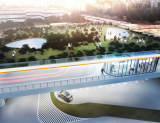
Het speelveld van de energiemarkt voor mobiliteit verandert in snel tempo. Het geloof in de verkoop van diesel en benzine verdwijnt. Gemeenten kunnen voorsorteren op de duurzame mobiele transitie door na te denken over de toekomst van huidige tankstationlocaties.
De vereisten voor het ombouwen van een tankstation tot een laadstation zijn afhankelijk van verschillende factoren, waaronder de grootte en indeling van het tankstation en de elektrische capaciteit van de ligging. Over het algemeen zal een geschikte locatie voor een laadpaal voldoende ruimte moeten bieden voor de minimale vereisten. Eveneens moet de locatie toegang hebben tot een betrouwbare en voldoende elektriciteitsvoorziening, waarvoor mogelijk upgrades van de lokale elektriciteitsinfrastructuur nodig zijn.
Onze two-pager over dit onderwerp lezen? Dat kan via deze link.
Contact over dit onderwerp opnemen? Dat kan via Hidde van der Maas of Anouk Hodemaekers.
Back to the Future: de Witkar, de eerste elektrische deelauto van Amsterdam
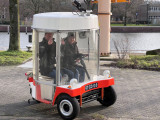
Toen ik als kleine jongen na lang zeuren eindelijk eens op de skelter van de buurjongen mocht rijden, was ik als kind zo blij. Hetzelfde overkwam me, zoveel jaren later nog eens vlak voor het einde van 2022. Door onze Community Manager Sophie was ik geattendeerd op een klein berichtje van NEMO de Studio, een soort dependance van NEMO met een eigen tentoonstelling ('energy junkies') op het Marineterrein. Praktisch buren van Amsterdam Smart City, waar ik sinds halverwege 2022 anderhalve dag per week werk op het thema mobiliteit.
NEMO de Studio ging rijden met de Witkar en je mocht mee, tenminste, als je de 'prijs' won. Daarvoor hoefde je alleen een mailtje te sturen. Nu ben ik dol op prijzen waar ik nagenoeg niets voor hoef te doen, dus dat mailtje was zo gestuurd. En tot mijn verbazing bleek ik gewonnen te hebben. Dus daar ging ik, op 29 december, naar NEMO de Studio.
Natuurlijk had ik Sophie en Pelle (mijn compagnon op het thema mobiliteit) meegevraagd en gedrieën werden we ontvangen door Jodie en Maaike van NEMO. De Witkar was aan het opladen, gewoon met een stekker in het stopcontact. Een driewieler die inderdaad grotendeels wit is, met een mooie rode bies aan de onderkant, en in de verte iets wegheeft van de Pausmobiel. Hoog en rondom ramen. Vanwege de mooie ronde koplampen doet het denken aan Brum, het oldtimer autootje met de ronde koplampen als ogen.
De Witkar reed tussen 1974 en 1986 rond in de stad. Het is feitelijk de eerste elektrische deelauto in Amsterdam. De bedenker ervan, Luud Schimmelpennink, is ook bekend van het Witte Fietsenplan. In totaal zijn er 38 Witkarren gemaakt waarvan er zo'n 25 daadwerkelijk hebben rondgereden. De autootjes stonden in speciaal gebouwde laadstations en konden door leden tegen een vergoeding gebruikt worden. Het was een non-profit initiatief; de opbrengsten werden beheerd door een stichting en werd geïnvesteerd in beheer en uitbreiding van het systeem. Hoeveel mensen er daadwerkelijk gebruik van hebben gemaakt is mij niet bekend.
En nu mocht ik het dus ook proberen. Zelf sturen zat er helaas niet in, maar meerijden is ook al een belevenis. De 'handrem' werd weggenomen, gewoon een stuk blok dat achter de wielen wordt gelegd (een echte handrem was kennelijk niet nodig). Na plaatsgenomen te hebben in de ovale coupé op het Gispen (jawel!) stoeltje naast Jodie die voor deze gelegenheid ook chauffeur was, kon het avontuur beginnen. Voor de gelegenheid hadden de dames een jaren 70 Spotify lijstje opgezet op een JBL- speakertje die achter de stoelen was gelegd (ruimte genoeg). Oude en nieuwe technologie die naadloos samengaan.
Nog even de gordel aan en hup het gaspedaal werd ingedrukt. Soepel accelereerde het karretje naar zo'n 15 km per uur. Het maximum ligt op 30 km/u maar het Marineterrein leent zich daar niet echt voor. Het ritje was niet heel comfortabel, door het gebrek aan schokdempers voel je elk hobbeltje. En door de vele kieren hebben wind en regen vrij spel. De Witkar zou in deze tijd ook ongetwijfeld worden afgekeurd voor gebruik op de openbare weg. Maar net als op de skelter destijds, heb ik ontzettend genoten. Wat een heerlijke ervaring! Comfort en gemak zijn hier niet het belangrijkste. Net zoals bij bijv. kamperen zijn andere zaken veel interessanter dan het comfort van een huisje of hotel. Plezier, authenticiteit, vrijheid, verbinding, avontuur, weg uit de hokjes, verzin het maar: de Witkar biedt het. Een mooie uitvinding van een visionaire man die zijn tijd duidelijk ver vooruit was. Dus, mag ik ajb nog een keer? Mijn buurjongetje destijds verhuisde vrij snel. Maar hopen dat deze buren lang op het Marineterrein blijven!
Amsterdam Smart City partners aan de slag met drie urgente maatschappelijke challenges
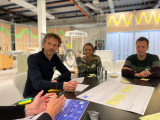
Hoe zet je de mens centraal in digitalisering? Hoe voorkom je uitsluiting van mensen die vervoer niet meer kunnen betalen? Hoe ontwikkel je samen lokale energiesystemen? Amsterdam Smart City werkt met 27 partners in co-creatie aan deze drie belangrijke vraagstukken.
Van digivaardige mensen naar mensvaardige digitalisering
Technologische en innovatieve ontwikkelingen volgen elkaar steeds sneller op. Als overheid wil en moet je hierin meegaan. Tegelijk leidt de inzet van digitalisering en data vaak tot ongewenste resultaten, wat de afstand tussen inwoners/ondernemers en de overheid vergroot.
Gemeente Haarlemmermeer verschuift haar focus van ‘het systeem staat centraal, mensen moeten maar digivaardig worden’ naar ‘de mens staat centraal, onze systemen moeten mensvaardig worden’. De onderliggende vraag is hoe zet je de mens écht centraal in digitalisering en het vormgeven van digitale systemen? De gemeente Haarlemmermeer zou graag samen optrekken om deze vragen uit te werken tot een advies dat breder inzetbaar is.
Mobiliteitsarmoede: hoe voorkomen we uitsluiting van mensen in het mobiliteitssysteem?
Stijgende benzine- en elektriciteitsprijzen; de toenemende digitalisering en afname van het openbaar vervoeraanbod zorgen er, onder andere, voor dat steeds meer mensen problemen hebben om zich te verplaatsen. Verduurzaming en deelmobiliteit lijken niet voor iedereen weggelegd en maatregelen om dit te stimuleren werken het probleem mogelijk zelfs in de hand. Het risico op sociale uitsluiting wordt hierdoor groter.
De provincie Noord-Holland en DRIFT maken zich zorgen over mobiliteitsarmoede en vragen zich af wat we eraan kunnen doen om deze mensen mobiel te houden. Er is echter nog weinig bekend over de omvang van het probleem, de exacte doelgroepen en welk instrumentarium werkt (en wat vooral niet). Daarom willen we graag in gesprek met de partners om tot gezamenlijk inzicht en een afgestemde aanpak te komen.
Samenwerking voor ontwikkeling lokale energiesystemen
De milieuproblematiek en de huidige hoge energieprijzen zorgen voor een snelle omschakeling van gas naar elektriciteit. Dat is de afgelopen jaren veel sneller gegaan dan voorzien, met netcongestie als gevolg.
Door samenwerking tussen lokale partijen kan er een zo optimaal mogelijk energiesysteem gecreëerd worden. Dat kan het elektriciteitsnetwerk ontlasten en, bijvoorbeeld, het maximaal gebruik maken van duurzame bronnen stimuleren en de energiekosten drukken.
Dit vraagt een intensieve samenwerking waarbij elke partij wordt uitgedaagd om verder te denken dan de eigen belangen. Er zijn geen bestaande structuren of systemen waar dit binnen past. Alliander doet een oproep voor samenwerking op dit vraagstuk.
Sinds november werken we in verschillende werkgroepsessies toe naar nieuwe initiatieven om antwoorden te bieden op deze uitdagende kwesties. Wil je ook meedenken en deel uitmaken van oplossingen? Neem contact op met Sophie via sophie@amsterdamsmartcity.com.
EEN BRUISENDE STADSWIJK VRAAGT OM INNOVATIEVE LOGISTIEK
Living labproject CILOLAB onderzoekt met studenten logistieke concepten voor een gebied in ontwikkeling
In het Klimaatakkoord staat een serieuze ambitie: in 2025 moeten 30 tot 40 gemeenten een zero-emissiezone hebben voor stadslogistiek. Het Universiteitskwartier in de historische binnenstad van Amsterdam leent zich voor een nieuwe inrichting van de logistiek. De druk op deze wijk neemt toe door een mix van wonen, werken, studeren én recreëren. ‘Wij onderzoeken samen met studenten logistieke oplossingen’, aldus Susanne Balm, onderzoeker in het living labproject CILOLAB bij de Hogeschool van Amsterdam (HvA). ‘Oplossingen die bijdragen aan efficiëntere, slimmere en schonere stadslogistiek.’
STUDENTEN ANALYSEREN DATA TOT LOGISTIEKE CONCEPTEN
Balm: ‘Wij analyseren samen met studenten de verwachte logistieke bewegingen in het Universiteitskwartier: hoeveel voertuigen en hoe vaak. Maar ook: wat voor producten, orders, verpakkingseenheden, zendingen en volumes komen voorbij, en wat is de herkomst? Daarnaast willen we patronen beter begrijpen, zoals fluctuaties en piekmomenten van bevoorraden.’ Studenten van Logistiek, Bedrijfskunde en Toegepaste Wiskunde helpen de data te verzamelen bij medewerkers en leveranciers van de Universiteit van Amsterdam (UvA) en te analyseren in sprints van zes weken. Sprint voorbij? Dan gaat een volgende groep studenten verder met de huidige stand van data. ‘Ook gaan we in gesprek met alle stakeholders’, vertelt een student. ‘We willen daarmee begrip, belang en invloed per stakeholder in kaart brengen.’
‘We zitten nu middenin de tweede sprint’, vertelt Balm. ‘Daarin laten we studenten en professionals uit de praktijk meedenken in nieuwe logistiek concepten die efficiënter, slimmer en schoner zijn voor dit specifieke gebied - hoe vaak goederen aanleveren, vanaf waar bundelen en hoe dan verder naar eindontvanger? In sprint drie gaan we een beperkt aantal van die concepten verder uitwerken. Ook stellen we dan specifieke vragen als: wat betekent dit voor de medewerkers? Vanaf welk logistiek punt moeten ze bundelen om daarna over te stappen op een uitstootvrij voertuig? Wat vinden ze daarvan? En uiteindelijk betrekken we ook bewoners en andere ondernemers, om het complete ecosysteem af te vangen.’
UNIVERSITEITSKWARTIER MOET EFFICIËNTER
Het Universiteitskwartier is de nieuwe binnenstadscampus van de UvA, waar theater, aula, winkels en diverse horecapunten gaan samenkomen. Het is naast een lastig bereikbaar gebied, ook kwetsbaar: kades storten er letterlijk in. En de partijen hebben elk hun eigen goederenstromen. Via hun inkoopgedrag zijn zij in staat nieuwe logistieke oplossingen te creëren. Namelijk door leveranciers te stimuleren en te faciliteren om goederenstromen te bundelen en door te kiezen voor uitstootvrij vervoer naar, van en op de campus.
‘Stadsgebieden in ontwikkeling worden drukker, en daarmee logistiek uitdagender. Maar ze bieden ook kansen om nieuwe logistieke concepten hand in hand te laten gaan met de ontwikkelingen, aldus Balm. Om die oplossingen te kunnen ontwerpen, is meer kennis nodig van de verwachte goederenvolumes en leverfrequenties. De logistieke vraag bepaalt de benodigde faciliteiten voor goederenontvangst, voorraad en distributie op de campus. Van glazenwassers tot vending machines en horeca.’
LIVING LAB CILOLAB
De HvA onderzoekt binnen het living labproject CILOLAB de rol van grote inkopers bij het stimuleren van schoon vervoer. Grote organisaties zoals gemeenten, onderwijsinstellingen en kantoorbedrijven genereren veel logistieke bewegingen in steden voor de levering van kantoorartikelen, catering, onderhoud en het inzamelen van afval. ‘Wij vinden dat er een ecosysteem gecreëerd moet worden waarin gemeente, leveranciers, hubexploitanten, kennisinstellingen en logistieke dienstverleners met elkaar samenwerken om efficiëntere logistiek te organiseren.’
https://www.cilolab.nl/
https://www.hva.nl/urban-technology/over-ut/over-ut.html
The importance of public space and e-moped sharing!
Did you know shared e-mopeds can be 175 times more efficient in terms of public space usage compared to cars?! Let us explain! 🔍
In Amsterdam, 30% of the people with a parking permit use their car once, or even less often, per week. There are 133.000 permit holders, so for these residents we need 39.900 parking spots (30% x 133.000). For their 39.900 weekly movements, we also need 39.900 parking spots.
Shared e-mopeds are used 7 days a week and let's assume about 5 times per day on average. On the space of one parking spot you could fit 5 e-mopeds. So one parking spot used for shared e-mopeds could facilitate 5 x 7 x 5 = 175 movements per week! For 39.900 weekly movements, you would only need 228 (!) parking spots, so this is also 175 times more efficient!
As you can see, sharing (of e-mopeds) is a much more efficient way of using scarce public space. We would say: let's turn some car parking spots into e-moped spots! 🛵
Please let us know what your thoughts are on this!💡 See also on LinkedIn:
#publicspace #emopeds #felyx #beatemissions
Two different technical specialist job opportunities

Are you interested in a career where you help shape the future of mobility? We are looking to potentially hire two Technical Specialists to join our team on a full-time (37 hours per week) / permanent basis. The roles of Technical Specialists cover a range of expertise and experience levels. You would become part of a small but growing team of experts in Amsterdam. We also work closely with our strategic partner Cenex in the UK. Cenex Nederland is a relatively flat organisation, fostering a work environment where we both support each other and encourage self-initiative and independence, and where communication is key.
For the current positions, we are looking for people with a good match in two different specialism areas. Does this peak your interest? Check out both applications, download the individual job vacancy specs on our website:
Technical Specialist – Circular, LCA and Eco-design
Technical Specialist – Zero-Emission and Smart Mobility
Please read the vacancies for further details and how to apply. We would love to hear from you!
https://cenexgroup.nl/2020/10/08/two-different-technical-specialist-job-opportunities/
Check introduceert de Parkeer Check: beter parkeren voor deelscooters
De opmars van de elektrische deelscooter is onmiskenbaar: het aantal Nederlandse steden waar het mogelijk is om een elektrische deelscooter gebruik te maken schoot het afgelopen jaar omhoog van 3 naar 14. De voordelen zijn evident: voor gebruikers levert het tijd en gemak op, en voor alle inwoners van de stad leidt het tot een schonere lucht, minder geluidsoverlast en een betere doorstroming van het verkeer. Toch zijn er ook minder positieve geluiden, met name rondom fout geparkeerde scooters in de openbare ruimte. Aanbieder Check voegt vandaag een nieuwe functionaliteit aan haar service toe om dit probleem tegen te gaan: de Parkeer Check.
Check zet in op bewustwording bij gebruikers
De introductie van de Parkeer Check gaat gepaard met een grootschalige campagne waarmee Check haar gebruikers bewust maakt van het belang van goed parkeren. Paul van Merrienboer, mede-oprichter van Check, vertelt: ‘Het is belangrijk dat onze gebruikers zich bewust zijn van het feit dat ze een scooter in de openbare ruimte parkeren. We willen toe naar een situatie waarin gebruikers niet alleen zichzelf maar ook elkaar verantwoordelijk houden voor hun parkeergedrag. We introduceren daarom een nieuwe functionaliteit in de app waarmee ze dit op een laagdrempelige manier kunnen doen.’ De Parkeer Check stelt gebruikers in staat om met een druk op de knop fout geparkeerde scooters te melden.
Een oplossing samen met de gebruiker
Gebruikers klikken in de app op de betreffende scooter en kunnen een melding maken met de knop ‘Meld parkeerprobleem’. Er wordt direct een foto van de situatie doorgestuurd waarna de vorige gebruiker een waarschuwing krijgt over zijn/haar parkeergedrag. Check volgt een strikt protocol: na 3 waarschuwingen is het voor de foutparkeerder (tijdelijk) niet meer mogelijk om van Check gebruik te maken. En moet de scooter verplaatst worden? Dan volgt een boete van € 50,-.
Pilot Smart Parking Haarlemmermeer van start
Niet meer eindeloos zoeken naar een plek voor je auto als het druk is, maar direct naar straten met vrije parkeerplaatsen rijden. Dat kan dankzij een nieuwe parkeerapp. In Hoofddorp is hiermee vorige week een proef van zes maanden gestart. Iedereen die in Hoofddorp woont, werkt of er regelmatig komt, kan de app gratis testen en feedback geven.
Become a vision zero city
Any human activity that causes 1,35 million deaths a year globally, more than 20 million injuries and a total damage of $1600 billion and is a major cause of global warming would be prohibited at once. With the exception of traffic, as it is tightly connected with our way of life and commercial interests.
In my post I introduce 'vision zero cities', like Helsinki and Oslo, that are on their way to reduce the number om traffic casualties to zero. How: by strict separation of types of traffic and speed reduction. You also can read that according to leaders of the industry, the advance of self-driving cars is stagnating and in the next decades will not contribute to safety.
OP ZOEK NAAR UITSTOOTVRIJE MOBILITEIT IN EUROPA

Het is European Mobility Week: extra aandacht voor duurzaam rijden
KLIMAATNEUTRAAL
Welke stappen zijn nodig om het Europese doel van klimaatneutraliteit in 2050 - netto geen CO2-uitstoot - te behalen? European Mobility Week moedigt steden en lokale instanties aan om duurzame stappen te ondernemen en te delen. Zodat we elkaar inspireren. Van 16 tot en met 22 september staat Europa, en zo ook de Hogeschool van Amsterdam (HvA), in teken van uitstootvrije mobiliteit: #WeMoveSmart.
‘Zero-emission mobility for all’. Het thema van European Mobility Week van 2020 zet het belang van een uitstootvrije toekomst voor iedereen in de schijnwerpers. Van laadpalen voor iedereen tot elektrische deelauto’s in de buurt, onderzoeksprogramma en Centre of Expertise Urban Technology timmert binnen lectoraten Energie en innovatie en City logistiek hard aan de weg om duurzame mobiliteit inclusiever te maken.
FUTURE CHARGING: LAADPALEN VOOR IEDEREEN
Het aantal elektrische voertuigen groeit in Nederland explosief. Dat is mooi. Het brengt alleen wel een nieuwe uitdaging met zich mee: voldoende laadpalen. HvA werkt binnen project Future Charging samen met gemeenten, laadexploitanten, energiebedrijven en netbeheerders aan de laadinfrastructuur van de toekomst, zodat iedereen met elektrische auto’s optimaal kan blijven laden. Middels een eigen simulatiemodel onderzoekt het team de effecten van toekomstscenario’s op het gebruik van laadinfrastructuur, de impact op het elektriciteitsnet en de openbare ruimte.
DUURZAME DEELAUTO’S EN LOGISTIEK
“Door onze grondige kennis op het gebied van laadgedrag en simulatiemodellen, kunnen we steeds beter scenario’s voor de toekomst rekenen en de toenemende belasting van het elektriciteitsnetwerk verminderen. Zo kijken we naar de laadbehoeften in 2030 en simuleren we scenario’s met snelladers en laadpleinen”, vertelt projectleider Rick Wolbertus. “Binnen Future Charging bouwen we tevens verder uit naar verschillende type vervoer zoals duurzame deelauto’s en logistiek. Zo kan elektrisch rijden toegankelijker worden.”
ELEKTRISCH RIJDEN OF WATERSTOF?
Elektrisch rijden is niet alleen essentieel voor particulier vervoer, ook in het bedrijfsleven moet een energietransitie in gang gezet worden zodat we de klimaatdoelstellingen halen. Binnen lectoraat City logistiek werkt HvA aan diverse projecten om horeca- en servicelogistiek te verduurzamen. Terwijl project Gas op elektrisch focust op het het elektrisch maken van bestelauto’s voor installatie-, reparatie- en onderhoudswerkzaamheden, gooit project H2WasteCollect het over een andere boeg met een alternatieve brandstoftechnologie: waterstof. In het project gaan vier vuilnisauto’s die volledig aangedreven worden door waterstof, ook wel H2-elektrische vuilnisauto’s, de dienst uitmaken om huisafval in te zamelen.
VERSCHIL MAKEN: VAN PRAKTIJKPROEVEN TOT ONDERWIJS
Om de onderzoeksresultaten in lijn met European Mobility Week breder beschikbaar te stellen, zoekt Urban Technology connectie tussen beroepspraktijk, wetenschap en onderwijs. Denk hierbij aan expertmeetings en workshops, professionele en wetenschappelijke artikelen, netwerkbijeenkomsten en onderwijsproducten, zoals case studies voor HvA-minoren - studiespecialisatie binnen een vakgebied. De projecten worden vaak samen gedaan met studenten vanuit verschillende invalshoeken. Zowel studenten met een achtergrond in Engineering, Data Science, Beleid en Psychologie werken aan de projecten om de energietransitie op gang te brengen. Dit gebeurt zowel tijdens colleges, groepswerk, stages en afstudeertrajecten bij vakpartners.
Elektrische deelscooter aanbieder Check lanceert in Amsterdam
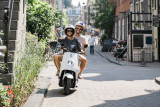
Snelgroeiende start-up Check biedt 350 elektrische deelscooters aan in Amsterdam.
Amsterdam zet al jaren in op minder autoverkeer in de binnenstad. Het inzetten van elektrische deelscooters draagt hier uitstekend aan bij: als meer mensen gebruikmaken van deelscooters, is er minder autoverkeer in de stad en zijn er minder parkeerplekken nodig. Marco Knitel, voormalig General Manager bij Uber en medeoprichter van Check, bevestigt dit vanuit de ervaring van e-deelscooter bedrijf Check in Rotterdam: “Als de beschikbaarheid goed genoeg is, zien we dat mensen op termijn afstand durven te doen van hun eigen vervoermiddel. We hebben in Rotterdam een grote groep klanten die onze e-scooters meerdere malen per week gebruikt en de deelscooter echt heeft omarmd als alternatief.” Vanaf vandaag zijn de Check e-scooters ook beschikbaar in Amsterdam. In de komende dagen zet het bedrijf er in totaal 350 neer.
Onnodige verkeersdrukte Amsterdam
Check wil de makkelijkste weg door de stad aanbieden. Met name voor autobezitters valt er veel te winnen: met de auto een rit maken in Amsterdam is namelijk geen pretje. Op dit moment staan er maar liefst 1400 auto’s per vierkante kilometer in de regio en onderzoek toont aan dat 37% van alle autoritten korter is dan 2 kilometer en in de stad zelf blijft. De verkeers verstopping is op dit moment zo groot dat je in de avondspits gemiddeld 17 minuten per half uur langer over een autorit doet. Steeds meer Amsterdammers stappen daarom over op slimme alternatieven om van A naar B te komen. De (e-)deelscooter is sterk in opkomst. Het is de ambitie van nieuwe aanbieder Check om de transitie van autobezit naar (e-)deelscooter verder te versnellen. “Mensen vragen snel naar vermeende concurrentie met andere deelmobiliteit aanbieders, maar het gaat juist om samenwerken. Hoe groter het aanbod, hoe groter de vraag”, aldus Paul van Merrienboer, voormalig manager bij Greenwheels en medeoprichter van Check.
Uitbreiding in andere steden
Naast de lancering in Amsterdam heeft Check afgelopen week ook 200 e-scooters toegevoegd aan haar vloot in Rotterdam. Dit is een verdubbeling van de 200 e-scooters waar Check afgelopen februari mee begon in de Maasstad. De operatie van Check in Den Haag gaat ook vanaf volgende week van start en Breda volgt daarna.
Deelmobiliteit populair in Coronatijd
Corona beïnvloedt de mobiliteitskeuze van mensen behoorlijk. Zo is het OV-gebruik nog steeds tientallen procenten onder het normale niveau en schaffen Nederlanders massaal (gebruikte) auto’s aan. Om ervoor te zorgen dat we niet een aantal stappen achteruit zetten heeft de gemeente Check gevraagd om de uitrol te versnellen. “We zien dat onze elektrische deelscooters juist aan populariteit hebben gewonnen gedurende de Corona crisis. Dat komt omdat we feitelijk ‘social distancing’ ingebouwd hebben in ons product. Gecombineerd met het feit dat sommige scooters tot wel 30 mensen per dag vervoeren is het niet alleen een heel veilig maar ook een zeer efficiënte manier van vervoer, ” aldus van Merrienboer.
Bronvermelding data in artikel: TomTom Index (2019), Pon Datalab (2018), CBS (2018)
Over Check
De missie van Check is het aanbieden van de makkelijkste weg door de stad. Check biedt hiertoe een mobiele app aan waarmee gebruikers elektrische deelscooters per minuut kunnen reserveren en gebruiken. Sinds februari 2020 is Check actief in Rotterdam en in de zomer van 2020 breidt het bedrijf haar diensten uit naar onder andere Amsterdam en Den Haag.
Liveability and traffic
In my newest post (in English) I explore under which conditions traffic can contribute to the liveability of cities
Dutch version: https://hmjvandenbosch.com/2020/07/13/de-beloopbare-stad/
Interesting article: 'Pricing the Curb' by prof. Donald Shoup
Abstract: "Parked cars have colonized city streets for so long they seem to own the curb lanes. Decolonizing is underway, however, because new demands are overcrowding the curb. E-commerce deliveries need truck-loading zones. Uber and Lyft need passenger-loading zones. Traffic congestion has increased the need for dedicated bus lanes. Cyclists want safe bike lanes, and pedestrians want wide sidewalks. The curb is the new urban frontier, and parking is not always its most productive use. The curb lane will not be used properly until it is priced properly. When it comes to managing the curb, cities can let prices do the planning and use the resulting revenue to pay for public services. Getting curb parking prices right will improve cities, the economy, the environment, and the planet."
When will Amsterdam become a zero city?
Traffic fatalities are a leading cause of premature death of people under 30. Most are pedestrians and cyclists. The question is how to redesign traffic to reduce the number of victims. Zero cities successfully do. Read my newest blogpost (in Dutch). The English version will be published in due time at Smart City Hub.
Stay up to date
Get notified about new updates, opportunities or events that match your interests.

